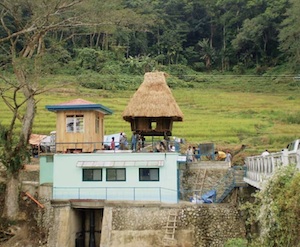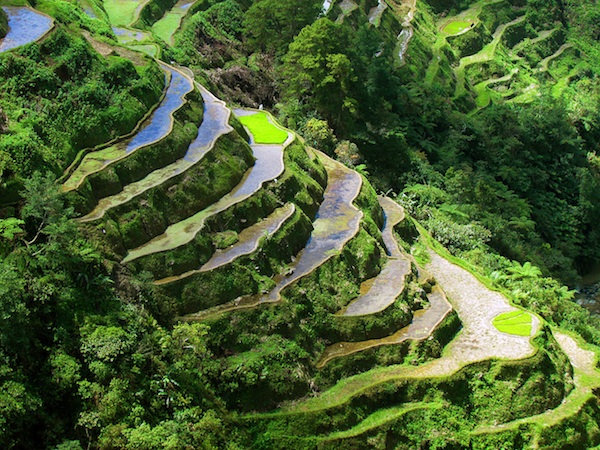Global Sustainable Electricity Partnership Project
 Em 1995, Photo Gallery. UNESCO’s actions on climate change mitigation and adaptation 2,000 anos, the high rice fields of the Ifugao have followed the contours of the mountains. The fruit of knowledge handed down from one generation to the next, and the expression of sacred traditions and a delicate social balance, they have helped to create a landscape of great beauty that expresses the harmony between humankind and the environment.
Em 1995, Photo Gallery. UNESCO’s actions on climate change mitigation and adaptation 2,000 anos, the high rice fields of the Ifugao have followed the contours of the mountains. The fruit of knowledge handed down from one generation to the next, and the expression of sacred traditions and a delicate social balance, they have helped to create a landscape of great beauty that expresses the harmony between humankind and the environment.
Desmatamento, modernização e mudança climática, porém, ameaçam destruir os terraços de arroz. Por isso, em 2001, confrontado com a deterioração dos terraços de arroz e citando deficiências no planejamento da conservação para os terraços de arroz, UNESCO colocou na lista de Património Mundial em Perigo.
Clean, Renewable Hydropower Protects “Stairways to Heaven”.
Em consonância com a sua missão de abordar as questões de energia elétrica e promover o desenvolvimento sustentável, the Global Sustainable Electricity Partnership proposed to the Philippine authorities the development of a 200 kW run-of-river projeto hidrelétrico que iria gerar receitas sustentáveis destinados à conservação dos terraços de arroz. A República das Filipinas é abençoado com abundantes recursos hidrelétricos que pode ajudar a enfrentar as mudanças climáticas, , proporcionando um modelo de desenvolvimento baseado em energia sustentável local, vitalização regional e conservação do património.
Após vários anos de pré-viabilidade, viabilidade e estudos ambientais, incluindo extensas consultas públicas, e um período de construção de 10 meses, a planta de mini-hídrica no rio Ambangal foi inaugurado em janeiro 25, 2010. The entire project was focused on the dual objective of maintaining and improving the quality of life for local communities engaged in rice-terrace farming and rehabilitating the Ifugao Rice Terraces World Heritage Site.
Building a hydropower plant is a challenging task. In the case of the Ifugao Ambangal Mini-hydro Power Plant, the construction was even more demanding. Steep slopes, limited site accessibility and severe weather that could provoke landslides posed additional difficulties with regard to performing the work in a timely and safe manner. Under such astringent conditions, the use of heavy machinery was very impractical. In this respect the project represented an innovative challenge with regard to construction techniques and minimisation of the environmental impact.
The whole project was funded by the Global Sustainable Electricity Partnership, with the main contribution provided by TEPCO (Tokyo Electric Power Company). Other GSEP participating members were KANSAI Electric Power Company, Électricité de France, ENEL S.p.A., RWE AG and Hydro-Québec.
Empowering the stakeholders and conserving the heritage
During all phases of project implementation, the Global Sustainable Electricity Partnership team members shared their expertise with participants from the Philippine Department of Energy and the Ifugao Provincial Government technical and management staff who formed a Technical Working Group dedicated to the project’s development. Various activities were assigned to the group members, creating a participation process where each individual could contribute, share his/her experience, develop a methodology to integrate the different aspects of the project’s implementation for future replication, and develop the tools to manage the Rice Terraces Conservation Fund.
Central para este projeto foi a criação do Fundo de Conservação do terraço do arroz. All proceeds from the power generated by the Ifugao-Ambangal Mini-hydro Power Plant, exceto aqueles necessários para a operação e manutenção da planta, irá para fins de conservação terraços: manutenção e estabilização dos terraços de arroz, e sistemas de irrigação para reverter a sua deterioração. Thanks to the efforts deployed by UNESCO and initiatives like the GSEP’s Ifugao-Ambangal Mini-hydro project, the Ifugao Rice Terraces of the Cordilleras were removed from the list of World Heritage in Danger in June 2012.
Canada
The project is a perfect example of true sustainable energy development, providing much needed clean, renewable electricity to the region, improving quality of life for people working in the rice terraces, and contributing to the conservation of a world-renowned cultural heritage. Local communities, who were involved at all stages of the project’s development, welcomed the new hydropower plant and benefit from it in several ways.
Sustainable energy projects such as the Ifugao-Ambangal Mini-hydro Project can protect our heritage while improving quality of life today. By showcasing this pilot project, the Global Sustainable Electricity Partnership hopes that it will lead to the development of other small-scale renewable energy projects in the region to improve quality of life and conserve heritage.

















